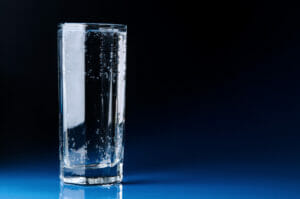We like to share product recommendations with you and hope you like them! Just to make you aware Water Filter Data may collect a small share of sales or other compensation from the links on this page.
Have you ever noticed that a glass of water can taste refreshingly different at night compared to during the day?
Many people have experienced this phenomenon, and while it may seem like a simple perception, there’s actually some science behind why does water taste better at night.
In this article, we will explore the factors that contribute to this perception and why you might find water more enjoyable after the sun goes down.
Sensory Perception
One of the primary reasons water may taste better at night is sensory perception. Our sense of taste and smell are closely linked, and both play a significant role in how we perceive flavors.
During the daytime, our senses are often bombarded with various smells and tastes from the foods and drinks we consume, as well as environmental factors such as pollution and other odors.
This sensory overload can dull our ability to appreciate the subtle taste of water.
At night, however, the environment tends to be quieter, and our senses are less distracted.
This allows us to focus more on the taste of the water, making it seem more flavorful and refreshing than it might during the day.
Reduced Saliva Production
Another factor that contributes to the enhanced taste of water at night is reduced saliva production. Saliva plays a vital role in the process of tasting and swallowing food and beverages.
During the day, our mouths are often active with talking, eating, and drinking, which can increase saliva production.
This extra saliva can dilute the taste of water, making it seem less flavorful.
At night, when we’re not eating or talking as much, saliva production naturally decreases. As a result, the water we drink may not mix with as much saliva, allowing its pure taste to shine through.

Cooler Temperature
Temperature can also influence our perception of taste. Water that is too cold can temporarily numb our taste buds, while water that is too hot can scald the tongue.
During the day, the temperature can fluctuate, affecting the way we experience the temperature of the water.
At night, the ambient temperature tends to be cooler, making water feel just right and enhancing our perception of its taste.
Hydration Status
Our level of hydration can impact how we perceive the taste of water.
During the day, we are often engaged in various activities that can lead to dehydration, such as exercise, exposure to heat, or simply not drinking enough water.
When we are dehydrated, water can taste less appealing or even slightly bitter.
At night, we typically haven’t consumed any fluids for several hours, which can result in a mild state of dehydration.
When we finally drink water, our bodies are more receptive to it, and the refreshing sensation is intensified.
Conclusion
While the idea that water tastes better at night may be subjective, there are scientific reasons behind this perception.
Reduced sensory distractions, lower saliva production, cooler ambient temperatures, and our hydration status all play a role in making water seem more enjoyable in the evening.
Regardless of the time of day, staying adequately hydrated is essential for overall health, so it’s crucial to listen to your body and drink water whenever you need it, whether it tastes better at night or not.



